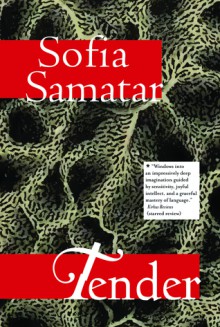
This is a beautiful, original, often surprising, and yes, tender, short story collection by a fantastic author. Samatar’s novels are lovely, but I think she may excel even more in the short story format, which combines her exquisite writing with compressed plots that necessarily move briskly. And her wide command of genres is impressive: fantasy, science fiction, historical fiction, fairy tales, contemporary, young adult. Most of the stories are sci-fi and fantasy, and while I love fantasy I typically avoid sci-fi, but I absolutely would read more if Samatar wrote it. Her stories never use characters simply as a long-winded way of examining an idea or making a point; instead the characters are the point, and no matter how inventive their settings, the stories are about the people, their lives and relationships. And to the extent they’re about larger issues, they are issues that matter in human society today, like race and religion.
But then there are stories that break the mold I would expect from a genre author. “Olimpia’s Ghost” is a work of epistolary historical fiction set in 19th century Europe, involving a relationship that may or may not have existed between two real people (I won’t say who since figuring it out myself was so much fun), while “Those” is an answer to Heart of Darkness, written in a similar vein but with the frame story narrated by a mixed-race character, which changes everything.
There are a lot of fantastic stories in this collection, and from perusing the reviews it looks like different readers have different favorites, which is a sign of strong writing. I’ll mention my favorites here:
“Selkie Stories Are For Losers” – A young woman in the contemporary U.S. builds her life in the shadow of a fairy tale. This could easily be a novel and I’d love to read it.
“Walkdog” – This is an epistolary story written with a certain amount of deliberate inelegance, since it’s meant to be by a typical high school girl. It’s an achingly sad story about love, bullying and social conformity, with a bit of mythology wrapped in. Unlike in a lot of YA, which seems to be a weird adult vision or fantasy of teenagers, I completely believed this one; no one would want to admit to making Yolanda’s choices, but they feel realistic.
“Honey Bear” – This is a lovely post-apocalyptic tale. In the tradition of my favorite short fiction, it’s a story you’ll want to read twice, because everything comes together at the end in a way that changes your entire view of the story, and so you re-read it with new eyes and understand all those references that didn’t quite make sense before. But despite the post-apocalyptic world, the story is closely focused on its main characters, and its heart and primary source of tension is a couple who react to changed circumstances in very different ways.
“How to Get Back to the Forest” – I’d classify this one as dystopian; it reminds me of Never Let Me Go, with young people raised in superficially pleasant institutions, slowly and imperfectly discovering how their world really works. The key difference is that here the characters resist, at least in small ways.
“Request for an Extension on the Clarity” – This is superficially science fiction, but it’s really about race and immigration and isolation; the protagonist finds refuge in the stars from a world where she doesn’t seem to belong anywhere. The collection includes several stories with similar themes, but this is the one that brought it all together for me.
“The Closest Thing to Animals” – Straight-up science fiction, set on a quarantined world, but about a character whose abandonment issues cause her to see rejection where it doesn’t exist and prevent her from seeing the ways in which others need her. The story is lovely and so are the weird images of its world.
“Fallow” – This is a novelette, by far the longest piece in the collection, set on a world inhabited by refugees from a self-destructing Earth. It’s a meditation on religion (eventually we’re given enough information to figure out what group is involved) and social pressure, hearkening back to the Puritans despite its otherworldly setting.
Of course, as with most collections, I didn’t love all the stories; some seemed opaque or didn’t quite land for me. In particular, there’s a stretch from “Tender” through “Meet Me in Iram,” of stories dealing with alienation and characters feeling out of place in their own skin – sometimes, though not always, related to immigration – that I bounced off of until I reached “Request for an Extension on the Clarity.” A few of the other contemporary or parable-like stories also didn’t strike any particular chord with me. But these are skillful stories that clearly landed for others, so I’ll chalk that up to my limitations as a reader rather than Samatar’s as a writer.
Overall, I loved this collection and would absolutely recommend it, probably even ahead of Samatar’s novels to those with any liking for short fiction. To my surprise, I especially loved Samatar’s science fiction and hope to see much more from her along these lines in the future.


 Log in with Facebook
Log in with Facebook 









